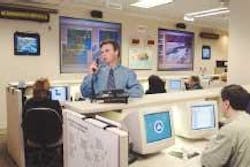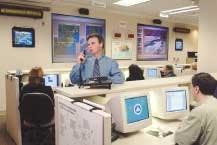Satellite-dispatch radio enhances Connecticut bioterrorism preparedness
By John McHale
HARTFORD, Conn. — Officials at the Connecticut Department of Public Health (CT-DPH) are deploying a satellite-based emergency communications system across the state that uses dispatch radio capability from Mobile Satellite Ventures (MSV) in Reston, Va.
The department, which two years ago responded to an anthrax case that also involved four other states, is the lead state agency deploying a system to coordinate public health communications to respond to a bioterrorism event or other health emergency.
The system, which Connecticut officials call "MEDSAT," receives money through the state's CDC Public Health Bioterrorism Preparedness and Response grant. MEDSAT connects the department's Command Post to all 32 Connecticut-based hospitals, the Connecticut Emergency Operations Center (EOC), and the Connecticut Hospital Association (CHA).
"We have implemented a very secure and reliable voice communications system," says Michael Purcaro, the department's communications manager and MEDSAT project leader. "We looked at hospitals as an important partner in which to build this infrastructure."
Department leaders have established several talk groups that link the department's Command Post to state hospitals, Connecticut's EOC, the department's mobile MEDSAT units, the state's two hospital-based Centers of Excellence for bioterrorism preparedness and response, and CHA.
Hartford Hospital in the northern tier of the state and Yale New Haven Hospital in the southern tier represent the Centers of Excellence.
The satellite terminals are deployed in dispatch centers and emergency command centers, says Scott Palmer, manager for the emergency communications center at Hartford Hospital. "It's a tremendous benefit for the state as a whole to have this system in place."
The satellite system provides the department, other hospitals, and Coordinated Medical Emergency Dispatch centers with a back-up system to ensure the ability to communicate critical messages in what may be the greatest time of need. "The state of Connecticut is covered," Palmer says.
"Being able to bring everyone together over one channel securely and reliably is not something we currently have the ability to do with cellular or traditional radio communications," says Kerry Flaherty, director of the Connecticut Office of Emergency Management.
"This is just the beginning of the state of Connecticut using leading-edge technology," Flaherty says. "We're very close to being able to support response and recovery under the worst possible conditions without losing communications. I think in the future we will expand the system to the local communities. It's going to be a great system."
The technology behind the emergency communications system is MSV Dispatch Radio Service. The solution has two-way group communications capability that enables one user to talk to many, or enables users to conduct private one-to-one conversations.
The Dispatch Radio Network has a mobile terminal, a MSV satellite (MSAT 1 or 2), a satellite hub and ground system, and a dispatcher.
To direct and redirect a fleet reliably, Dispatch Radio Service has two-way voice dispatch or one-way voice broadcast service, which can be a cost-efficient alternative to land-based radio communications systems, MSV officials claim. Users do not have to build and maintain their own private network, which minimizes capital costs and eliminates network support costs.
The MSV network acts much the same as a radio tower, turning the entire continent into a single cell and transmitting signals to and receiving signals from subscribers on the ground. Dispatch Radio Service can also be configured to provide extra security to subscribers, MSV officials say.
Mobile Satellite Ventures offers customers a choice of wireless data, voice, fax, and dispatch radio services via its two MSAT satellites. For more information, visit MSV online at www.msvlp.com.

